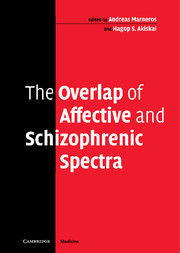Book contents
- Frontmatter
- Contents
- List of contributors
- Preface
- 1 The paradigma of overlapping affective and schizophrenic spectra: schizoaffective conditions
- 2 The overlapping of the spectra: overlapping genes and genetic models
- 3 The continuum of psychosis and its genetic basis
- 4 Functional psychoses: molecular-genetic evidence for a continuum
- 5 State- and trait-related deficits in sustained attention in bipolar disorder: are there any overlaps with schizophrenia?
- 6 The concept of schizoaffective disorder: utility versus validity and reliability – a transcultural perspective
- 7 Phenomenological approaches to the schizoaffective spectrum
- 8 Clinical course of schizoaffective disorders
- 9 Depressive syndromes in schizophrenia
- 10 The overlapping of the spectra: brief and acute psychoses
- 11 Overlapping of the spectra: physical comorbidity between schizophrenia and affective disorders
- 12 The overlapping of the spectra suicide
- 13 Biological treatment of schizoaffective disorders
- 14 Psychological therapies and schizoaffective disorders
- Epilogue: The interface of affective and schizophrenic disorders: a cross between two spectra?
- Index
5 - State- and trait-related deficits in sustained attention in bipolar disorder: are there any overlaps with schizophrenia?
Published online by Cambridge University Press: 02 September 2009
- Frontmatter
- Contents
- List of contributors
- Preface
- 1 The paradigma of overlapping affective and schizophrenic spectra: schizoaffective conditions
- 2 The overlapping of the spectra: overlapping genes and genetic models
- 3 The continuum of psychosis and its genetic basis
- 4 Functional psychoses: molecular-genetic evidence for a continuum
- 5 State- and trait-related deficits in sustained attention in bipolar disorder: are there any overlaps with schizophrenia?
- 6 The concept of schizoaffective disorder: utility versus validity and reliability – a transcultural perspective
- 7 Phenomenological approaches to the schizoaffective spectrum
- 8 Clinical course of schizoaffective disorders
- 9 Depressive syndromes in schizophrenia
- 10 The overlapping of the spectra: brief and acute psychoses
- 11 Overlapping of the spectra: physical comorbidity between schizophrenia and affective disorders
- 12 The overlapping of the spectra suicide
- 13 Biological treatment of schizoaffective disorders
- 14 Psychological therapies and schizoaffective disorders
- Epilogue: The interface of affective and schizophrenic disorders: a cross between two spectra?
- Index
Summary
Introduction
The manic and depressed states of bipolar disorder have a clear impact upon cognitive function (Clark and Sahakian, 2006). Cognitive deficits are also widely regarded to represent a core feature of schizophrenic illness (Green et al., 2004). Neuropsychological testing aims to characterize the domains of cognitive impairment and cognitive sparing in a disorder, with the use of standardized quantitative assessment (Lezak, 1995). In understanding the neuropsychology of psychiatric disorders, it is useful to distinguish state and trait markers of impairment (Nuechterlein et al., 1992; Clark and Goodwin, 2004). A state marker is manifested during acute episodes (such as depression) and recovers on symptom remission. A state-related deficit is likely to correlate with symptom ratings (e.g., depression ratings on the Hamilton scale). A trait marker, on the other hand, persists during periods of symptom remission and is therefore more likely to be associated with the underlying neuropathology of a disorder. A trait marker may be completely stable across phases of illness, or may be state-modulated, whereby the deficit persists in the absence of symptoms but is exacerbated during acute episodes (Nuechterlein et al., 1992).
According to the traditional Kraepelinian view of psychosis, bipolar disorder and schizophrenia represent categorically distinct disease entities, distinguished by the chronic, deteriorating course of schizophrenia contrasting with the episodic, fluctuating course of bipolar disorder (Kraepelin, 1899).
- Type
- Chapter
- Information
- The Overlap of Affective and Schizophrenic Spectra , pp. 79 - 103Publisher: Cambridge University PressPrint publication year: 2006



